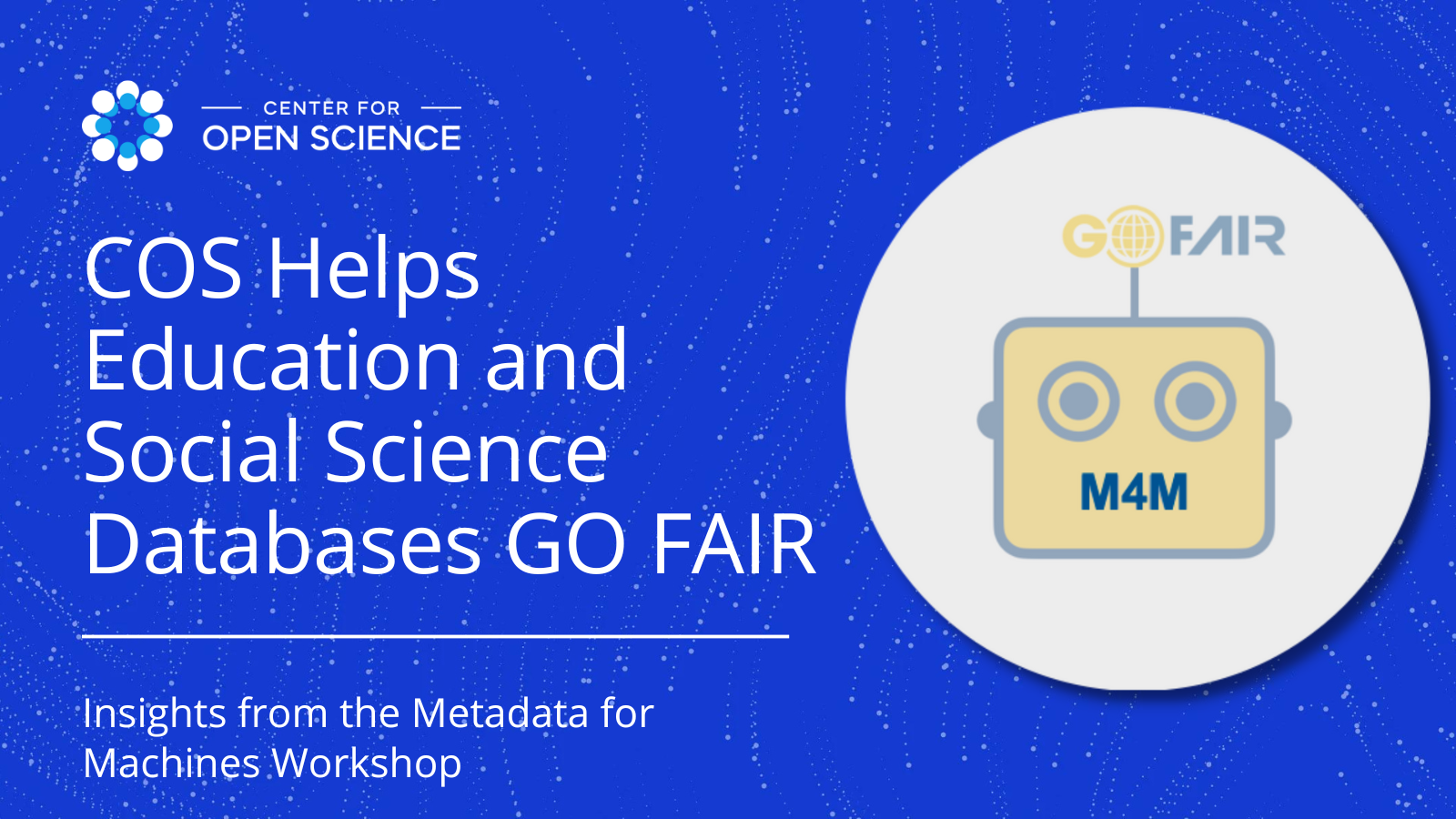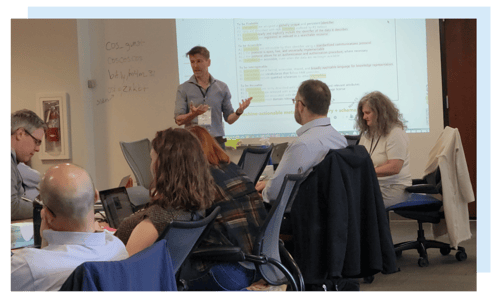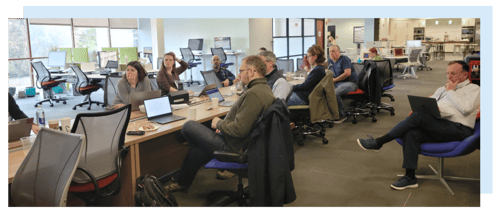
Metadata, also known as “data about data,” contains information about research objects (data, materials, preprints, and so on) that is helpful in locating and providing context to shared materials. In 2023, COS shared information about why metadata is important and updates we have made to our workflows on OSF to better allow researchers to add metadata to their OSF materials.
 On November 14 and 15, 2023, GO FAIR led a Metadata for Machines workshop in Charlottesville, Virginia, for COS staff and members of four communities of practice from education research and related fields: LDbase, metaBUS, Psych-DS, and a budding group related to the scientific study of religion.
On November 14 and 15, 2023, GO FAIR led a Metadata for Machines workshop in Charlottesville, Virginia, for COS staff and members of four communities of practice from education research and related fields: LDbase, metaBUS, Psych-DS, and a budding group related to the scientific study of religion.
During the first day of the workshop, attendees were introduced to the basics of metadata, including vocabularies, taxonomies, and schemas. They learned about the value of FAIR Implementation Profiles (FIPs), which are snapshots of the choices made by communities of practice around their implementation of FAIR resources. Some of those choices concern community standards around metadata, which was the primary focus of the workshop. Teams were introduced to the Sheet2RDF pipeline for creating FAIR vocabularies for use in repositories.
The community leaders followed a systematic Q&A process about their practices around how community members can find (meta)data, standardized communication protocols for talking about (meta)data, how machines can understand (meta)data vocabularies and models, and common practices around licensing. Together, the communities created a FAIR vocabulary and openly published it on Bioportal. On the second day of training, the teams were shown how to design and use metadata templates using the CEDAR Workbench, a computational ecosystem for the development, evaluation, use, and refinement of metadata. The online CEDAR metadata templates created in the workshop were powered by autocomplete and drop down menus using the FAIR vocabulary published the previous day. This allows anyone to easily create high-quality FAIR (machine-actionable) metadata compliant to the community standard. The OSF is currently working on implementing the CEDAR embeddable metadata editor into our platform. This will allow users to add additional FAIR metadata to their projects and files via CEDAR’s interoperable, standards-based templates.
On the second day of training, the teams were shown how to design and use metadata templates using the CEDAR Workbench, a computational ecosystem for the development, evaluation, use, and refinement of metadata. The online CEDAR metadata templates created in the workshop were powered by autocomplete and drop down menus using the FAIR vocabulary published the previous day. This allows anyone to easily create high-quality FAIR (machine-actionable) metadata compliant to the community standard. The OSF is currently working on implementing the CEDAR embeddable metadata editor into our platform. This will allow users to add additional FAIR metadata to their projects and files via CEDAR’s interoperable, standards-based templates.
OSF already supports the Generalist Repository Ecosystem Initiative’s (GREI) common metadata standard (based on the DataCite Metadata Schema), giving users and communities a common set of shared elements to build on. Implementing the CEDAR editor will expand metadata stored and searched in the OSF to meet additional needs of communities. Because the CEDAR editor is built using interoperable FAIR principles, the planned CEDAR integration also expands OSF’s ability to share metadata across the open science community. COS expects to have this feature deployed by early 2024.
Looking ahead, LDbase is working on creating a template to put into CEDAR, which would be usable for OSF users. They are also exploring ways to sustain the long term maintenance of this template.
MetaBUS is making some adjustments to their vocabulary and have uploaded a "beta" version of their ontology/vocabulary to Bioportal. They have obtained a ROR ID and will soon integrate the vocabulary into CEDAR.
Psych-DS is continuing to develop their validator, which should be out in the next year. This validator will make it easier for researchers to check whether their metadata meets community standards.
Pew Research is continuing to build community buy-in for FAIR standards within metadata, define terminology, and building up collaborative support for creating metadata standards.
This work is partially supported by NSF award 1937698. Any opinions, findings, conclusions, or recommendations contained within this material are those of the authors and do not necessarily reflect the views of NSF.

210 Ridge McIntire Road
Suite 500
Charlottesville, VA 22903-5083
Email: contact@cos.io

Unless otherwise noted, this site is licensed under a Creative Commons Attribution 4.0 International (CC BY 4.0) License.
Responsible stewards of your support
COS has earned top recognition from Charity Navigator and Candid (formerly GuideStar) for our financial transparency and accountability to our mission. COS and the OSF were also awarded SOC2 accreditation in 2023 after an independent assessment of our security and procedures by the American Institute of CPAs (AICPA).
We invite all of our sponsors, partners, and members of the community to learn more about how our organization operates, our impact, our financial performance, and our nonprofit status.